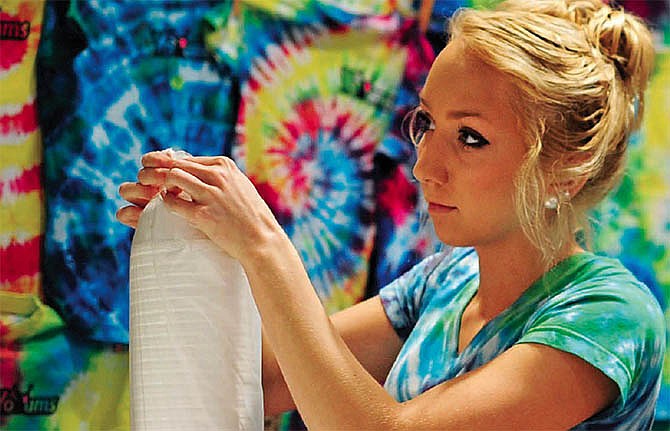Cara Champlain currently isn't using her accounting degree for much but to set her family's tight budget around what she earns from her minimum-wage job.
"I'd love to find an accounting job, but right now, it's a little hard," she said. "I don't have my CPA, so it's harder to get in. I'm under-qualified for an accounting job, but I was getting told that I was overqualified for everything else because of my degree."
But after several years of unemployment, Champlain is grateful to be earning $7.65 per hour for 20 hours of reception work a week at Council for Drug-Free Youth in Jefferson City, where she was placed in a subsidized position by non-profit agency Central Missouri Community Action.
Who are minimum-wage earners?
[The age group with the highest percentage of workers earning at or below the federal minimum wage was 16- to 24-year-olds, at 11 percent of all workers in that group.
,5.4 percent of U.S. female workers earned at or below minimum wage, while only 3.3 percent of males did.
,1.9 percent of full-time workers (35 hours a week or more) earned at or below minimum wage, compared to 10.3 percent of part-time workers.
,Information from the U.S. Bureau of Labor Statistics' 2013 "Characteristics of Minimum Wage Earners."
, Information from the U.S. Bureau of Labor Statistics' 2013 "Characteristics of Minimum Wage Earners."]Although her fianc©'s paycheck and some temporary cash assistance from the state help make ends meet, she still becomes apprehensive about supporting her 2-year-old daughter and paying child support for two older children.
"We have learned to live on a budget, and we stick to that budget. We have to, otherwise we won't make it," Champlain said. "It gets very stressful when you realize you can't get something because you don't have the money between food and bills."
Champlain is one of about 73,000 Missourians - 4.7 percent of the state's hourly-paid workers age 16 and over - who earn at or below the $7.25-per-hour federal minimum wage, according to U.S. Bureau of Labor Statistics (BLS) data from 2013, the most recent year available. That's a higher rate than the 4.3 percent of hourly-paid workers across the United States - who make up 58.8 percent of the U.S. workforce - who earned at or below minimum wage that same year. (Those listed as earning below minimum wage may include employees whose wages were supplemented by overtime pay, tips or commissions not included in the survey data.)
Some believe current minimum-wage rates don't keep pace with today's cost of living. Corporations like Target and Wal-Mart recently have raised their employees' minimum wages to $9 per hour, and President Barack Obama urged Congress to raise the federal minimum wage from $7.25 to $10.10 per hour during his 2014 State of the Union Address.
But others believe minimum wage is high enough as is; and except for the state's automatic cost-of-living adjustment, minimum-wage law has not changed in Missouri since 2006.
Who would benefit?
Approximately 73 percent of Americans support raising the minimum wage to $10.10 per hour, according to a Pew poll conducted in January 2014.
"It is important that we have a minimum wage that is at a sweet spot - not so high that it would cause businesses to close, but high enough that you have a chance to make it," said Jeanette Oxford, executive director of Empower Missouri, a Jefferson City-based organization that advocates for policies addressing several social issues. "When we have a lot of low-wage jobs that don't give adequate access to basic human needs, there are real consequences to us as a nation."
Oxford noted issues like homelessness - and subsequent struggles with children becoming established in school systems and persisting to graduation - as potential results of people trying to live on less than a living wage.
A living wage in Cole County is $7.43 per hour for a single adult, but $15.98 per hour for one adult with one child or $16.59 per hour for two adults with two children, according to a calculator formulated by the Massachusetts Institute of Technology.
"They really need to look at what the cost of living is and what minimum wage is," Champlain said. "They talk about wanting to get people off welfare. ... I can't come off of welfare if I'm only making $7.65 an hour. It's not enough to pay the bills and survive."
This year, Missouri legislators filed five bills proposing raises to the state's minimum wage, with rates ranging from $9.50 to $10.25 per hour. Similar bills have been filed in the past several years, but most never make it past the committee stage.
"I believe it's important to reward and encourage work through public policy. I think minimum wage is one of the smartest ways we can do that," said state Rep. Jon Carpenter, D-Gladstone, whose House Bill 314 proposes to raise Missouri's minimum wage incrementally to $8.50 per hour in 2016 then to $9.50 per hour in 2017. "People who take the time to work full-time jobs and who work hard deserve to be able to make a living wage."
Those who disagree argue that minimum-wage earners working full-time jobs are few - and minimum-wage earners are few all together.
"Only 1 percent of Americans are earning minimum wage, and half of that 1 percent are young people in entry-level positions - that is one-half of 1 percent," said Karen Buschmann, vice president of communications for the Missouri Chamber of Commerce and Industry.
That calculation factors in hourly-paid workers earning right at the federal minimum wage, but not those listed by the BLS as earning below minimum wage. The two groups together make up 2.1 percent of U.S. hourly-paid wage earners.
Another argument against raising minimum wage is that most earning it are not supporting families.
"The vast majority - 55 percent - of people working on minimum wage are people under the age of 25. The majority aren't raising a family," said Brian Bunten, director of legislative affairs for the Missouri chamber. "A lot of them are teenagers, where we already see a lot of unemployment. Increasing the minimum wage would be very detrimental to that population."
The age group with the highest percentage of U.S. workers earning at or below the federal minimum wage in 2013 was 16- to 24-year-olds, at 11 percent of all workers in that age group. Workers under age 25 make up about one-fifth of all hourly-paid workers in the United States, but account for roughly half of those paid minimum wage or less, the BLS noted.
That leaves another 1 percent of Americans 25 and older earning at or below minimum wage, plus more whose wages would be affected by an increase to the minimum - 87.9 percent of U.S. workers who would be affected by a jump to $10.10 per hour are over age 20, according to a 2013 study by the Economic Policy Institute.
"So it's not just teenagers," Oxford said.
Bad for business?
A priority for those against raising minimum wage is protecting businesses from raised costs.
"I think you have a legislature that is overwhelmingly pro-business, and I think they see the impact of minimum wage as detrimental to a lot of the employers and, frankly, to some of the employees as well," Bunten said.
A February 2014 study by the Congressional Budget Office projected raising the minimum wage would prompt businesses to eliminate some jobs for low-wage workers, estimating nationwide losses of up to 500,000 jobs if it were raised to $10.10 per hour and 100,000 if it were raised to $9.
"We don't see how that would be any different here in Missouri," Bunten said.
The Missouri Restaurant Association echoed the sentiment in its June 2014 study, predicting a minimum-wage jump to $10.10 per hour would cause loss of more than 15,000 jobs statewide.
"It's simple economics. If you have the cost of business rising, you have to make up that cost somewhere, and that will be shifted to the employees or the customer," Bunten said.
Others argue the benefits to low-wage workers would actually create more economic activity.
"I think it will have a profoundly positive effect on the economy and on business," Carpenter said. "Seventy percent of our GDP is based on consumer demand. When you give folks a raise in minimum wage, invariably they will go and spend those dollars as consumers and end up spurring economic growth."
State Sen. Jamilah Nasheed, D-St. Louis, who is sponsoring Senate Bill 215 proposing to raise Missouri's minimum wage to $10 per hour, also disagrees with the concerns about effects on employment.
"I have seen businesses throughout other states that raised the minimum wage, and that was never the case. There was no job loss as a result of increasing the minimum wage in other states," she said. "It's not happening like they're suggesting."
The results are mixed in the sampling of states that have raised minimum wages recently. Four states - Connecticut, New Jersey, New York and Rhode Island - passed legislation that raised their minimum wage in 2014. (Another nine, including Missouri, raised their minimum wage in accordance with automatic cost-of-living escalators).
In those four states, employment rates actually increased in three during the first five months of 2014 - Rhode Island's by 1.28 percent, New York's by 0.54 percent and Connecticut's by 0.11 percent - according to a June 2014 study by the Center for Economic and Policy Research. But New Jersey's employment lagged behind all 49 other states, decreasing by 0.56 percent.
Economic development experts are wary of cost factors that could deter companies from locating in their state.
"Anything that would put us in a less competitive advantage we would oppose. Missouri is competing for jobs, especially with states in our region and certainly with states that surround us," Bunten said.
Missouri currently sits in the middle of its neighboring states' minimum wages at $7.65. Iowa, Kansas, Kentucky and Oklahoma set their minimum wages at the federal rate of $7.25 per hour; Arkansas at $7.50; Nebraska at $8 and Illinois at $8.25.
Cost considerations
Those who would directly experience any economic effects are business owners themselves, and they, too, are divided on the issue.
"I would support a minimum-wage increase," said Dale Gerstner, owner of the Best Western Capital Plus Inn on Christy Drive.
The hotel, which employs 22 people - including four or five housekeepers, more typically known for earning low wages - pays more than half its employees at least $10 per hour, and no one earns minimum wage after their 30-day orientation period, Gerstner said.
"I just don't feel like someone should work right at minimum wage in my industry," he said.
But for businesses that hire primarily young, entry-level employees, the effect could be greater.
"Most of the people that come to work for my store are on their first jobs," said Chris Wrigley, owner of Zesto South on Jefferson Street, which employs around 10 people and pays minimum wage for all entry-level positions. "Of those people who earn minimum wage, they're either in high school or recently graduated from high school."
While he would be willing to absorb a small increase to payroll costs, a larger minimum-wage hike might bleed over into prices.
"A small business like mine - a family-owned, quick-serve restaurant - we operate on a very narrow margin. ... Any place where there's an increase in that price to provide the food is going to be reflected in the price of the food," Wrigley said. "There's only so much I can raise my product until I fall out of being competitive with the rest of the restaurants."
Other fast food-type restaurants likely would do the same. YoYums, a frozen yogurt shop on High Street, pays its servers - mostly high school- and college-aged - higher than minimum wage, but would have to make up for the difference elsewhere to continue doing so, depending how high the minimum was raised to.
"We would have to raise our prices. We have to make a certain amount," said owner Lisa Kemna. "We've got great kids here. The reason we get great kids is we pay better and we treat them amazing. So we would pay them more, and we would have to flow it through."
Wrigley said he might also reconsider employment decisions.
"I'm not turning anybody out the door; I'm just not going to hire any more people," Wrigley said. "If I can do the same job with three employees on a Sunday night and I really ought to have four on a Sunday night, if the price per hour paid for an employee increases, then I'm going to make the decision to work with three employees, absorb the difference in minimum wage and work those kids a little bit harder."
Nikki Payne, owner of Snob Shop Exchange and Fine Mess Boutique, said she would do the same. Between both stores, she employs five people - four who work part-time at minimum wage.
"I wouldn't ever raise the prices here," Payne said. "What I would probably more likely do is just cut hours. ... I would have to either cut hours immensely or do away with employees. It's sad to say, but we would just have to make do."
Even Gerstner, whose employees earn over minimum wage, said he would have to evaluate some costs if minimum wage jumped to near $10 per hour.
"We'll look at things like vacation benefits and other benefits as wages rise," Gerstner said. "We could cut costs on overtime. ... I'm not saying we would, but it would be something we would look at."
What's next?
Legislators pushing for a higher minimum wage say they're willing to negotiate to get it passed.
"I proposed $10 an hour simply because I think that that is a number that my colleagues would be willing to negotiate and come to terms with. I don't believe that that is enough, but I believe that's a start," Nasheed said.
Compromise fueled Carpenter's incremental approach, too: "There are folks in the Republican Party and some in the business community who contend that raising the minimum wage too high too soon would kill jobs. So by taking an incremental approach, the bill seeks to bridge that gap, getting to where we need to be at $9.50 an hour but also doing it over two years," he said.
But legislative progress has been slow. Nasheed's 2014 bill was recommended by the Senate's Small Business, Insurance and Industry Committee, but it was never taken up for debate on the floor.
In 2015, a hearing was held on Senate Bill 193, which proposes a $10-per-hour minimum wage. No further action has been taken on the bill sponsored by Sen. Paul LeVota, D-Independence.
Nasheed's and Carpenter's bills, and a proposal by Rep. Brandon Ellington, D-Kansas City, were assigned to committees, but no hearings have been scheduled.
Rep. Michael Butler, D-St. Louis, introduced a bill that never was sent to a committee.
"I don't think (raising) the minimum wage is going to pass in our current legislature," Oxford said, noting the current Republican majority. "I would be kind of surprised if it got debated in our state."
An alternative would be to put the issue to a general election via a ballot initiative. Missouri's current minimum-wage policy became law in 2006 as an initiated statute, and Arkansas raised its minimum wage to $7.50 per hour last year through the ballot initiative process.
"If Republicans in Jefferson City refuse to raise the minimum wage, I have no doubt that if a petition gets out and it's on the ballot, the people of Missouri would vote in favor of a raise in minimum wage," Carpenter said.
Champlain certainly would. While she plans to continue her master's coursework and prepare for the CPA exam, the degree will take her at least two years to complete, extending the length of time before she likely could secure a higher-paying job. And for her, the higher her base pay, the better.
"At $8 an hour, it would probably help some, but there's no guarantee that it's going to help the way they're wanting, the way it needs to," she said. "It getting raised up to $10 an hour would actually help a lot because there would be more money. That might be able to get us to loosen our budget some to where maybe we can do a little bit more or have a little bit extra to where we can set it back and start setting up a nest egg."
MORE
Inside the April 27, 2015, issue of #JCMO Inside Business, read about:
- Today's top jobs
As college grads are getting fitted for their gowns, some are finding they're in high demand in the workplace.
- Are you looking to hire?
Recruiting, hiring and retaining employees can require an adept, flexible strategy in today's marketplace.
- A drive to thrive
Lincoln University president has a vision of a brighter future for the university and for Jefferson City.
These stories and more inside the April 27, 2015, issue of #JCMO Inside Business.





